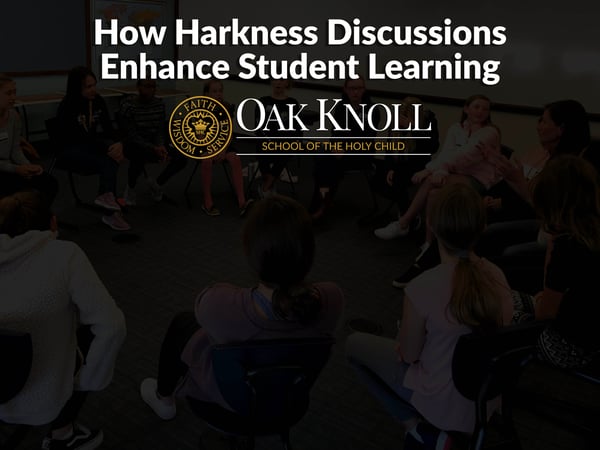When I taught middle school, one of my colleagues periodically mentioned facilitating Harkness discussions in her senior class. I never thought to inquire more (my middle schoolers kept me busy!), but I was intrigued by the details she provided when she talked about it. After I returned to teaching high school seniors, I saw that the New Jersey Association of Independent Schools was offering a workshop on how to facilitate Harkness discussions and decided it was time to learn about this method of teaching. I signed up and, on a cold winter day, went to The Lawrenceville School to learn about the Harkness method.

The first thing the workshop facilitator did was engage us, the workshop participants, in a Harkness discussion, and I immediately saw the benefits of this method. Coincidentally, the benefits of a Harkness discussion are the goals of the method:
- to invite the students to talk to each other
- to invite the students to listen to each other
- to invite students to be open to changing their opinions
Encourages student discussions
When teachers engage students in large-group discussion, too often the term “discussion” masks the reality of what happens in class: student-teacher dialogues while the rest of the class plays the role of audience. When facilitating a Harkness discussion, the teacher relinquishes command of the room and, instead, allows her students to talk to each other. The challenge with such an approach is two-fold: (1) the teacher has to be(come) comfortable with no longer being the “knowledge-keeper” but, instead, facilitating and participating in the learning process, and (2) it takes time and practice for students to learn to talk to one another. Once they learn to talk with one another, though, students can translate this collaboration to other classes and outside of the classroom.
Inspires Students to Listen
Similarly, when introducing Harkness discussions to a class, it takes time for students to learn to listen and, when appropriate, respond to each other’s comments. Rather than wait their turn to say what they think about the initial question, Harkness discussions require students to listen to each other and participate in the conversation as it unfolds. In light of this goal, the teacher must be(come) comfortable with relinquishing control of content goals. Of course, the teacher provides the material to discuss and the questions on which the conversation is grounded, but once the conversation begins, the educational focus should include the teacher only participating when someone says something in error. Harkness is an opportunity for students to develop their listening and critical thinking skills no matter the content or subject matter.
Strengthens Student Collaboration
Finally, as students listen to their peers, they are encouraged to be open to change. Harkness discussions are not debates; they are opportunities for collaboration and change. When the facilitator passed out a rubric he uses to grade Harkness discussions, I was struck that the points earned for “listening” were determined, in part, by the student’s ability to be humble (“my point of view is not the only one to consider”) and purpose (“I listen to others in order to refine my own thinking”). There are several moments in my day-to-day life that I would not score well in this category!
After attending this workshop, I introduced Harkness discussions in my senior class with success, and I hope to continue to build it into the course. But introducing this method of learning is not without its challenges. I must:
- continue to resist the urge to fall back on familiar practices of teacher-centered conversation
- help students become comfortable with a new method of learning that requires them to be active participants as they listen, talk and change their minds
- balance Harkness with project-based learning
While there are not always clear pathways to get through these challenges, the beauty of teaching is that I get another chance the next day, the next week, and the next year to help my students grow as learners.




